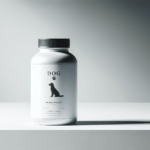
Ensuring your furry friend stays happy and healthy involves understanding the essential nutrients critical for their well-being. Just as you carefully choose your diet, your dog’s nutrition should be given equal importance. Proteins, fats, carbohydrates, vitamins, and minerals all play vital roles in maintaining your dog’s overall health, from healthy skin and coat to robust joint and dental health. By integrating high-quality dog food and veterinarian-recommended supplements, such as omega-3 fatty acids and glucosamine, you’ll support your dog’s body in numerous ways. Always consult with a veterinary professional to tailor a diet plan that meets your dog’s specific breed needs, age, and health conditions, ensuring a life full of vitality and joy. Have you ever wondered about the key nutrients your dog needs to stay healthy and vibrant throughout their life? Ensuring your furry friend receives all the essential nutrients is crucial to their overall health and well-being. Enter the world of canine nutrition, and you may be surprised at how similar it is to human nutrition in terms of variety and complexity.
What Are the Essential Nutrients for Maintaining a Dog’s Health?

Understanding Canine Health and Well-being
When it comes to maintaining your dog’s health, there are several aspects to consider. Just like humans, dogs have specific nutritional requirements that contribute to their overall well-being. Veterinary experts from the American Veterinary Medical Association and other prominent organizations stress the importance of a balanced diet, regular veterinary check-ups, and suitable supplementation.
Key Nutrients Your Dog Needs
To give your dog the best chance at a long and healthy life, focus on the following essential nutrients:
Proteins
Proteins play a vital role in the growth, maintenance, and repair of your dog’s tissues. They are the building blocks of your dog’s body and are necessary for producing enzymes, hormones, and other bodily chemicals. High-quality sources of protein include chicken, beef, fish, and lamb.
Fats
Healthy fats, particularly omega-3 and omega-6 fatty acids, are crucial for maintaining your dog’s skin and coat health, as well as supporting normal heart function. These fats are found in fish oil, flaxseed oil, and chicken fat.
Carbohydrates
While not as critical as proteins and fats, carbohydrates provide a valuable source of energy. They also support healthy bowel movements. Whole grains, vegetables, and fruits are excellent sources of complex carbohydrates.
Vitamins
Vitamins are organic compounds that dogs need in small amounts for various bodily functions. Key vitamins like A, D, E, and K play roles in vision, bone growth, and blood clotting. Commercial dog foods usually contain the necessary vitamins but always consult with your vet for specific needs.
Minerals
Minerals such as calcium, phosphorus, and potassium are essential for your dog’s bone health, nerve function, and muscle function. High-quality commercial dog foods typically include these minerals, but supplementation may be needed for specific health concerns.
The Importance of Veterinary Guidance
Your veterinarian plays a crucial role in assessing your dog’s dietary needs. Regular dental cleanings, vaccinations, and diagnostic tests can help identify any nutritional deficiencies or health issues that could be impacting your dog’s quality of life. Always consult your veterinarian before introducing new supplements or making significant changes to your dog’s diet.
Popular Dog Health Products and Supplements
There is a plethora of health products and supplements designed to support various aspects of canine health. Below are some popular categories to consider:
Multivitamins
Multivitamins can help ensure your dog gets a broad spectrum of essential nutrients. They’re especially useful for picky eaters or dogs on restricted diets.
Joint Health Supplements
Supplements containing glucosamine and chondroitin are beneficial for maintaining joint health, especially in older dogs or breeds prone to hip and joint issues. These supplements help support a normal inflammatory response and healthy cartilage.
Probiotics
Probiotics are beneficial for digestive health. They support a healthy gut flora, which can be particularly helpful for dogs experiencing digestive issues or those on antibiotics.
Fatty Acids
Omega-3 fatty acids, found in fish oils, support healthy skin and coat and can improve overall inflammation responses. They’re a great addition for dogs at any age.

Natural Remedies and Organic Products
For those who prefer organic and natural options, there are numerous products available:
- Organic Dog Food: Formulated without synthetic pesticides, fertilizers, or genetically modified organisms (GMOs).
- Natural Dog Remedies: Botanical-based solutions for anxiety, skin issues, and digestive health.
- Organic Supplements: High-quality ingredients sourced naturally to support specific health issues.
Indicators of Good Health
Regularly checking your dog’s health indicators can help you spot any potential issues early. Here are some signs to look for:
Healthy Skin and Coat
A shiny coat and itch-free skin are indicators of good health. Nutrients like omega-3 fatty acids play a crucial role in maintaining healthy skin and fur.
Normal Bowel Movements
Consistency and frequency in bowel movements are good indicators of digestive health. If your dog experiences frequent diarrhea or constipation, it may be time to consult your vet about dietary adjustments.
Active and Alert Behavior
A well-nourished dog will be active, alert, and exhibit normal energy levels. Lethargy or excessive fatigue can be a sign of nutritional deficiencies.

Tailoring Diet to Different Life Stages
Puppies
Young dogs need diets rich in protein, fat, and essential vitamins to support their rapid growth. Puppy-formulated foods meet these requirements and are designed to support optimal development.
Adult Dogs
Adult dogs need a balanced diet that includes all essential nutrients but in moderated amounts to maintain a healthy weight and activity level.
Senior Dogs
Older dogs often require diets that support joint health and may benefit from supplements like glucosamine and chondroitin. Senior dog foods are low in calories but rich in essential nutrients to prevent weight gain and promote overall health.
Special Considerations
Breed-Specific Needs
Different breeds have different nutritional requirements. For example, large breeds may require additional joint support, while small breeds need smaller, more frequent meals.
Health Concerns
Dogs with specific health concerns such as allergies, digestive issues, or chronic conditions may require specialized diets. Consult with your vet to design a diet tailored to these needs.
Responsible Dog Ownership
Being a responsible dog owner means more than just providing food and shelter. It involves:
- Regular Veterinary Visits: To catch any potential health issues early.
- Balanced Diets: Ensuring your dog gets all the nutrients they need.
- Physical Exercise: Keeping your dog active to support overall health.
- Mental Stimulation: Providing toys and activities that challenge your dog’s mind.
Here’s a Quick Reference Table for Essential Nutrients and Their Sources
| Nutrient | Source Examples | Importance |
|---|---|---|
| Protein | Chicken, Beef, Fish, Lamb | Tissue growth, repair |
| Fats | Fish Oil, Flaxseed Oil, Chicken Fat | Skin health, heart function |
| Carbohydrates | Whole Grains, Vegetables, Fruits | Energy, bowel health |
| Vitamins | A, D, E, K | Vision, bone growth, blood clotting |
| Minerals | Calcium, Phosphorus, Potassium | Bone/nerve/muscle function |
| Omega-3 Fatty Acids | Fish Oil | Skin health, inflammation response |
| Glucosamine | Supplements | Joint health, cartilage maintenance |
| Chondroitin | Supplements | Joint health, cartilage maintenance |
| Probiotics | Supplements, Yogurt | Digestive health |
Conclusion
Understanding and fulfilling your dog’s nutritional needs are integral components of responsible dog ownership. By focusing on a balanced diet rich in essential nutrients, regular veterinary check-ups, and appropriate supplementation, you can help ensure your dog’s optimal health and well-being through every stage of their life. Always keep in mind that consultation with veterinary health experts is key to making informed decisions about your dog’s diet and health products. Stay proactive, and your furry friend will be by your side in their best health for years to come.







